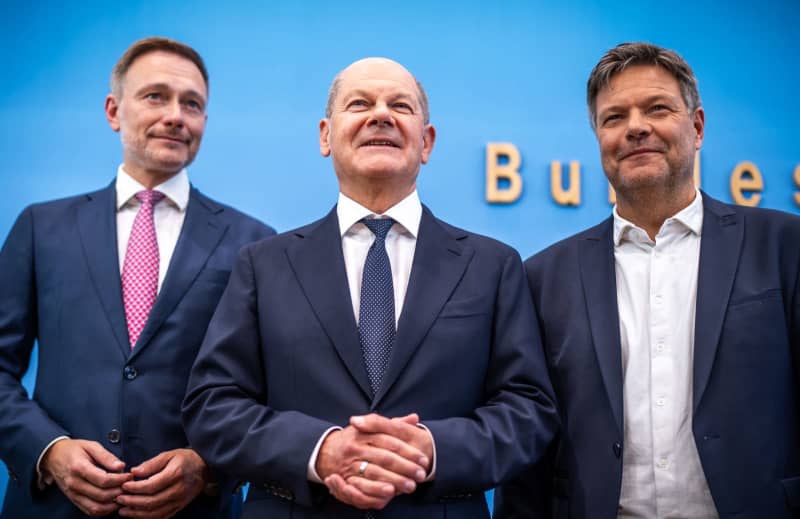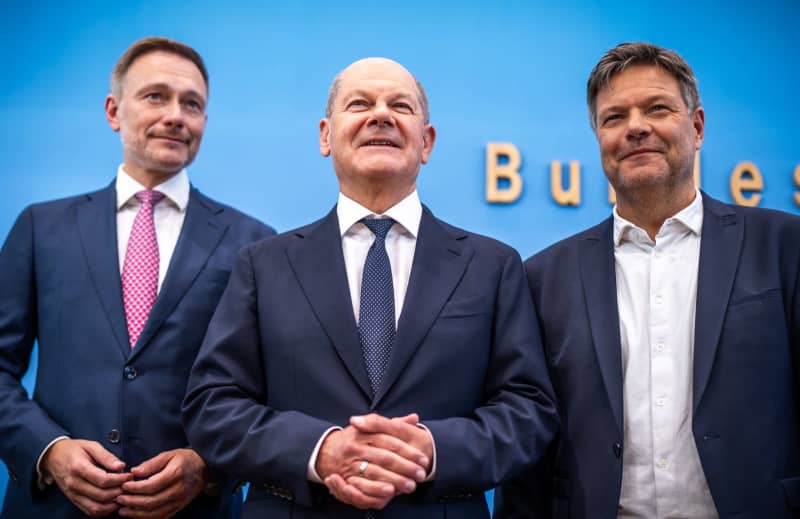
The leaders of Germany’s three-party coalition reached a major breakthrough in negotiations over the 2025 state budget on Friday, seemingly ending weeks of discussions over the finances of Europe’s largest economy.
The coalition leaders – Chancellor Olaf Scholz of the Social Democratic Party (SPD), Economy Minister Robert Habeck of the Greens and Finance Minister Christian Lindner of the pro-business Free Democratic Party (FDP) – reached a preliminary agreement on a financial plan to try to secure additional economic growth of more than 0.5% in the coming year.
The coalition wants to maintain strict rules against regular budget deficits, the so-called debt brake, and is counting on a significant increase in economic output, worth an estimated €26 billion ($28 billion) and a supplementary budget of €11 billion to compensate for shortfalls in government spending.
The breakthrough on the €481 billion budget came after weeks of negotiations that continued overnight on Thursday, with Scholz saying: “Sleeping is overrated.” The three leaders held a press conference in Berlin to share details of the deal.
Scholz, Habeck and Lindner originally wanted to reach an agreement by Wednesday at the latest and now want to present a budget at a cabinet meeting on July 17.
The Bundestag, the lower house of the German parliament, is expected to begin deliberating on the draft budget from mid-September, with approval possible as early as November.
Growth plan for Germany
The coalition’s new financial plan is intended to revive the German economy, which has been in trouble since the corona pandemic.
Business associations have long complained about barriers to growth such as high tax burdens, shortages of skilled workers and excessive bureaucracy.
Left-wing critics blame the debt brake, which was added to the German constitution in 2009 as a result of the financial crisis, and which is preventing key investments in infrastructure and education.
The main stumbling block during the negotiations was the billion-euro deficit in government spending. Lindner’s FDP refused to ignore the debt brake to allow for additional borrowing and investment, while the SPD ruled out cuts to social security.
Lindner said the government will remain within the limits of the debt brake while borrowing €44 billion for the coming year, out of a total budget of €481 billion in spending.
“We are easing the burden on citizens and businesses,” the Finance Minister said at the press conference, announcing a tax cut for citizens worth €23 billion over the next two years.
Spending on child welfare is also expected to increase: emergency child benefits for families in need will increase by €5 in 2025, while the government plans to invest €2 billion over the next two years in improving the quality of childcare facilities.
Incentives for unemployed and foreign workers
The core of the new agreement is aimed at tackling several issues to stimulate economic growth, such as encouraging the long-term unemployed to re-enter the labour market and attracting foreign workers by reducing bureaucratic hurdles.
Employer contributions to pensions and unemployment insurance for employees already receiving a pension will in future be paid directly as wages. This will provide incentives to work more.
Social security expenditure will be increased by ‘start-up financing’. This will encourage the long-term unemployed to retain a larger part of their income in the first year of their new job, without losing their benefits.
In addition, tax-free allowances will be increased and the income tax rate will be adjusted to inflation. A tax exemption for overtime will also be introduced.
German companies will also benefit from tax breaks worth billions of euros.
Scholz said the new financial plan will allow companies to deduct investments and research expenses from their tax bills, while allowing them to apply for subsidized loans from the state investment bank KfW to boost economic growth.
Habeck said the deal would bring “new economic dynamism” to Germany. The economy minister pointed to reforms to enable foreigners to find work in Germany more quickly.
In addition, subsidies on electricity prices will be extended until 2030.
Scholz defends military spending
Scholz promised that spending on the German armed forces would be maintained, after the terms of the preliminary agreement provided only a modest increase for the Bundeswehr.
The new deal proposed a €1.2 billion increase in personnel for the armed forces, well below the €6 billion demanded by Defence Minister Boris Pistorius.
Scholz said the Bundeswehr’s regular budget will amount to €80 billion ($87 billion) after 2028, when the special €100 billion emergency fund for the armed forces — agreed after Russia’s large-scale invasion of Ukraine in 2022 — is exhausted.
The chancellor said the €80 billion would ensure Germany would meet NATO’s 2% of GDP defence spending threshold. The Bundeswehr’s current regular budget is €52 billion.
Scholz defended the deal in Berlin on Friday morning, saying: “It is about a strong defense, a strong Bundeswehr that provides protection against the aggressive rulers of our time.”
Opposition: Knockout coalition only ‘postponed’
According to Markus Söder, a leading opposition figure from the CSU (Christian Social Union) in Bavaria, the deal will not be enough to fundamentally turn around the German economy, nor to reverse the fortunes of the crisis-hit coalition.
“I don’t think that will be enough. The knockout is just postponed,” he said.







